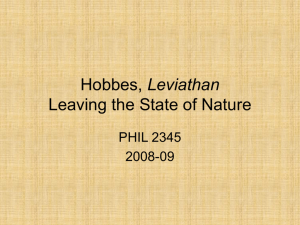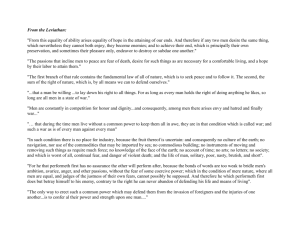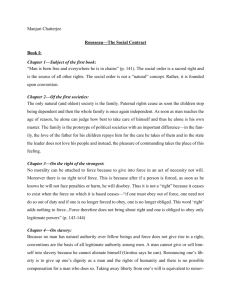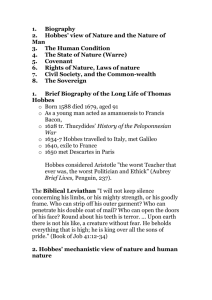- Marcello Musto
advertisement
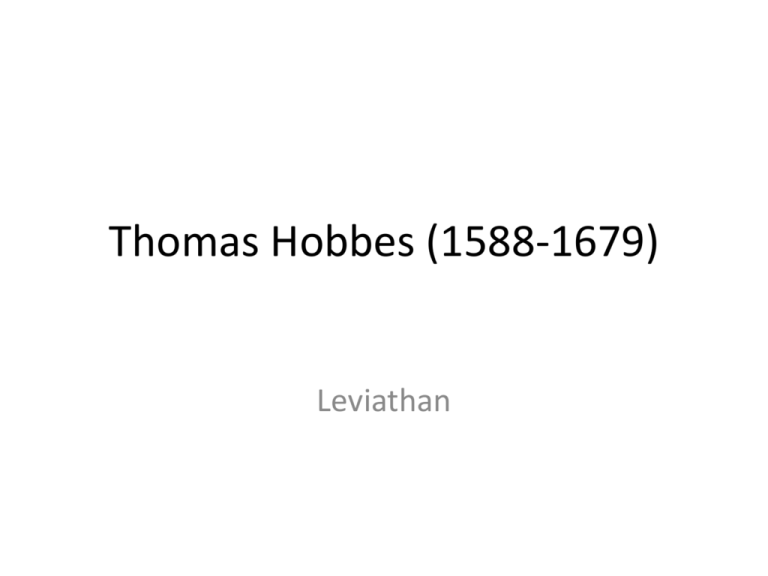
Thomas Hobbes (1588-1679) Leviathan • English philosopher • one of the founders of modern political philosophy • Social contract theory Life • Born prematurely when his mother heard of the invasion of the Spanish Armada. • Hobbes: "my mother gave birth to twins: myself and fear.“ • Very little is known about his childhood • Completed his B.A. in 1608 • And “arrived” to philosophy only at the end of the 1620s • In the 1630s spent a lot of time in Paris. He came back to England in 1637, but left again in 1640, when Long Parliament succeeded the short. • Friendship with Descartes. • He was also in Paris during the years of the composition of Leviathan. • After the publication of the Leviathan and from the time of the Restoration, Hobbes acquired a new prominence • "Hobbism" became a common and respectable expression. • In this period, the king Charles II, Hobbes's former pupil, called him to the court and grant him a pension of £100. • 1666: the king was also important in protecting him when, the House of Commons wanted to accuse him of atheism and profaneness. • The only consequence: he could never thereafter publish anything on human conduct Main Works • • • • 1640. The Elements of Law, Natural and Politic 1650. Treatise on Human Nature 1642. De Cive (Latin) [Engl. Trans. 1651] 1651. Leviathan, or the Matter, Forme, and Power of a Commonwealth, Ecclesiasticall and Civil • 1655. De Corpore (Latin) [1656 English translation] • 1675. English translation of Homer's Iliad and Odyssey Political Thought • Natural Law: universal system determined by nature • In this condition there was Bellum omnium contra omnes: "the war of all against all“ • Homo homini lupus est: "man is a wolf to [his fellow] man." • To ensure protection and peace, men abandoned the “natural” condition and created an “artificial man”, the Leviathan. • Leviathan is a product of the “calculation” of men. Very different from Aristotle: zoon politikon in human nature and the realization of men is in the polis • “Natural” man arrives to political society because he is pushed by the need. • “Natural” men self-impose the necessary restrictions to preserve their lives and avoid war sword and a crosier • Sword: because a coercive power is absolutely necessary • Crosier: because Hobbes wanted to avoid a competion/opposition of powers (temporal power and spiritual power). • Men would have two masters, in that case… • Therefore, Leviathan is, at the same time, the head of the state and the head of the church (even though he had personal hostility toward religion) Form of government • Personal preference for monarchy • And against the “mixed form” (he is completely different from the corporative form ideated by Althusius) • Rights (and duties) of the Leviathan are always the same, whatever is the form of the government • He was also against another “mistake”: considering the law more important than the sovereign Natural Law Theory • At the middle of the XVII century there was a radical change in terms of how to think about society • Natural law theory was the new approach, which lasted until French Revolution • Individualism is a key element of this revolution • The will of single individuals is essential for the constitution of the body politic Social contract • The social contract is most important moment, the agreement to avoid the conflict • This kind of social contract is radically new compared to previous contracts: before it was expression of ‘associations’ who persisted after its stipulation. Now there is not a transfer of an existing power, but the creation of a civic power. • No longer many ‘powers’ into a hierarchical system, but a summa potestas • This “new” power is based on the rights of individuals. Aristotle’s idea that someone rules over other men is no longer accepted • The political power which is constituted after the contract does not coincide with the government of a single man, but is the power of all body politic • Individuals disappear, after the stipulation of this power Leviathan (1651) Chapter 10. Power, worth, dignity, honour, and worthiness • The greatest of human powers is that possessed by one natural or civil person (that is, one human person or one person-like political entity) to whom most men have agreed to hand over their individual powers. 13. The natural condition of mankind… • as long as men live without a common power to keep them all in awe, they are in the condition known as ‘war’; and it is a war of every man against every man. (War) • whatever results from a time of war, when every man is enemy to every man, also results from a time when men live with no other security but what their own strength and ingenuity provides them with. (…) worst of all—continual fear and danger of violent death. (War) • In this war of every man against every man nothing can be unjust. The notions of right and wrong, justice and injustice have no place there. (…) where there is no law, there is no injustice. In war the two chief virtues are force and fraud. Chapter 14. The first and second natural laws, and contracts • The RIGHT OF NATURE , which writers commonly call jus naturale, is the liberty that each man has to make his own decisions about how to use his own power for the preservation of his own nature—i.e. his own life—and consequently the liberty of doing anything that he thinks is the aptest means to that end. • [The Latin phrase jus naturale standardly meant ‘natural law’; but jus could mean ‘right’, and Hobbes is clearly taking the phrase to mean ‘natural right’]. • A LAW OF NATURE (lex naturalis) is a command or general rule, discovered by reason, which forbids a man to do anything that is destructive of his life or takes away his means for preserving his life, and forbids him to omit anything by which he thinks his life can best be preserved. • As long as every man continues to have this natural right to everything—no man, however strong or clever he may be, can be sure of living out the time that nature ordinarily allows men to live. And consequently it is a command or general rule of reason that every man ought to seek peace, as far as he has any hope of obtaining it; and that when he can’t obtain it he may seek and use all helps and advantages of war. First law of nature • Seek peace and follow it. Second law of nature • When a man thinks that peace and selfdefence require it, he should be willing (when others are too) to lay down his right to everything. [Contract] • The mutual transferring of a right is what men call a CONTRACT • It is impossible to make a covenant with God except through mediators to whom God speaks (either by super-natural revelation or by his lieutenants who govern under him and in his name). Chapter 15: Other laws of nature • Third law of nature: Men should perform the covenants (pacts) they make • Fourth law of nature (GRATITUDE): A man who receives benefit from another out of mere grace should try to bring it about that the giver of the benefit doesn’t come to have reasonable cause to regret his good will. • Fifth law of nature [COMPLAISANCE]: Every man should strive to accommodate himself to the rest • Sixth law of nature (PARDON): A man ought to pardon the past offences of those who repent of their offences, want to be pardoned, and provide guarantees of good behaviour in the future. • Follow many more laws for a total of 19. • The laws of nature are immutable and eternal. Chapter 17. The causes, creation, and definition of a commonwealth • the final cause or end (men) have in mind when they introduce the restraint upon themselves under which we see them live in commonwealths (…) is the prospect of their own preservation and, through that, of a more contented life; i.e. of getting themselves out of the miserable condition of war which necessarily flows from the natural passions of men when there is no visible power to keep them in awe and tie them by fear of punishment to keep their covenants and to obey the laws of nature • For the laws of nature—enjoining justice, fairness, modesty, mercy, and (in short) treating others as we want them to treat us— are in themselves contrary to our natural passions. • And covenants without the sword are merely words, with no strength to secure a man at all. (Great Number) • However great the number, if their actions are directed according to their individual wants and beliefs, they can’t expect their actions to defend or protect them against a common enemy or against injuries from one another. • (…) When that happens they are easily subdued by a very few men who agree together; and when there’s no common enemy they make war on each other for their particular interests. (Limited time) • For the security that men desire to last throughout their lifetimes, it’s not enough that they be governed and directed by one judgment for a limited time (…) difference of their interests makes it certain that they will fall apart and once more come to be at war amongst themselves • (a man’s biggest pleasure in his own goods comes from their being greater than those of others!) • The agreement of these creatures (bees and ants) is natural, whereas men’s agreement is by covenant only, which is artificial; so it’s no wonder if something besides the covenant is needed to make their agreement constant and lasting, namely a common power to keep them in awe and direct their actions to the common benefit. • The only way to establish a common power that can defend them from the invasion of foreigners and the injuries of one another (…) is to confer all their power and strength on one man, or one assembly of men, so as to turn all their wills by a majority vote into a single will. • This is more than mere agreement or harmony; it is a real unity of them all. They are unified in that they constitute one single person, created through a covenant of every man with every other man, as though each man were to say to each of the others: I authorize and give up my right of governing myself to this man, or to this assembly of men, on condition that you surrender to him your right of governing yourself, and authorize all his actions in the same way. • When this is done, the multitude so united in one person is called a COMMONWEALTH, in Latin CIVITAS. • This is the method of creation of that great LEVIATHAN , or rathe of that mortal god to which we owe, under the immortal God, our peace and defence. For by this authority that has been given to ‘this man’ by every individual man in the commonwealth, he has conferred on him the use of so much power and strength that people’s fear of it enables him to harmonize and control the wills of them all, to the end of peace at home and mutual aid against their enemies abroad. • A commonwealth is one person of whose acts a great multitude of people have made themselves the authors (each of them an author), doing this by mutual covenants with one another, so that the commonwealth may use the strength and means of them all, as he shall think appropriate, for their peace and common defence. • He who carries this person is called SOVEREIGN, and said to have ‘sovereign power’, and all the others are his SUBJECTS Chapter 18. The rights of sovereigns by institution • A commonwealth is said to be ‘instituted’ when a multitude of men agree and covenant—each one with each other— that: When some man or assembly of men is chosen by majority vote to present the person of them all (i.e. to be their representative), each of them will authorize all the actions and judgments of that man or assembly of men as though they were his own, doing this for the purpose of living peacefully among themselves and being protected against other men. This binds those who did not vote for this representative, as well as those who did. For unless the votes are all understood to be included in the majority of votes, they have come together in vain, and contrary to the end that each proposed for himself, namely the peace and protection of them all. • From the form of the institution are derived all the power and all the rights of the one having supreme power, as well as the duties of all the citizens 1. Subjects cannot cahnge the form of government • Sovereigns (…) cannot lawfully get together to make a new covenant to be obedient to someone else. • They are bound, each of them to each of the others, to own and be the proclaimed author of everything that their existing sovereign does and judges fit to be done; • Some men have claimed to base their disobedience to their sovereign on a new covenant that they have made not with men but with God; and this also is unjust, for there’s no covenant with God except through the mediation of somebody who represents God’s person 2. Sovereign’s power cannot be taken • a covenant (pact) that they make with one another, and not a covenant between him and any of them; there can’t be a breach of covenant on his part; and consequently none of his subjects can be freed from subjection by a claim that the sovereign has forfeited his right to govern by breaking his covenant with his subject(s). It is obvious that the sovereign makes no covenant with his subjects (Against Althusius) • The opinion that any monarch receives his power by covenant—i.e. on some condition— comes from a failure to grasp this easy truth: Because covenants are merely words and breath, they have no force to oblige, contain, constrain, or protect any man, except whatever force comes from the public sword 3. Noboby can protest • must submit to the majority’s decrees 4. Sovereign’s actions cannot be object of accusation • because every subject is by this institution of the commonwealth the author of all the actions and judgments of the sovereign, it follows that nothing the sovereign does can wrong any of his subjects, nor ought any of them to accuse him of injustice. • Someone who complains of being wronged by his sovereign complains about something of which he himself is an author 5. Sovereign cannot be punished by subjects (whatever he does) • no man who has sovereign power can justly be put to death or punished in any other way by his subjects. 6. The sovereign is the judge… • It is for the sovereignty [‘the man or assembly of men to whom the sovereignty has been given’] to be the judge of what opinions and doctrines are threats to peace and what ones tend to support it; and consequently of which men are to be trusted to speak to multitudes of people, on what occasions, and how far they should be allowed to go; and of who shall examine the doctrines of all books before they are published 7-12. • Follow 6 other minor rights/powers/duties • These are the rights that make the essence of sovereignty, and are the marks by which one can tell what man or assembly of men has the sovereign power. For these rights and powers can’t be shared and can’t be separated from one another. • And because these rights are essential and inseparable, it necessarily follows that in whatever words any of them seem to be granted to someone other than the sovereign, the grant is void unless the sovereign power itself is explicitly renounced Objections • But someone may object here that subjects are in a miserable situation because they are at the mercy of the lusts and other irregular passions of him who has (or of them who have) such unlimited power. • These complainers don’t bear in mind that the human condition can never be without some inconvenience or other, or that the greatest trouble that can possibly come to the populace (…) is almost nothing when compared with the miseries and horrible calamities that accompany a civil war. Chapter 21. The liberty of subjects • men have pursued peace and their own survival by making an artificial man, which we call a commonwealth, so also they have made artificial chains, called civil laws, which they have by mutual covenants fastened • The liberty of a subject lies only in the things that the sovereign passes over in regulating their conduct: such as the liberty to buy and sell and otherwise contract with one another, to choose their own home and diet and trade, to educate their children as they think fit, and the like. • he who has the supreme power, i.e. the commonwealth, can’t wrong his citizens, even though he can by his wickedness do wrong to God • The liberty that is so frequently mentioned and honoured in the histories and philosophy of the ancient Greeks and Romans (…) is the liberty not of particular men but of the commonwealth. • Among masterless men there is perpetual war of every man against his neighbour “true liberties” • We come now to details concerning the true liberty of a subject, i.e. what the things are that a subject may without injustice refuse to do when commanded to do them by the sovereign. To grasp the answer to this, we must consider what rights we relinquish when we make a commonwealth, or (the same thing) what liberty we deny ourselves by owning all the actions—all without exception—of the man or assembly we make our sovereign. For our obligation to obey and our liberty • 1. covenants not to defend one’s own body are void. • Therefore, If the sovereign commands a man to kill, wound, or maim himself, that man has the liberty to disobey • 2. All other liberties depend on the silence of the law. A subject is at liberty to do A or not do A, as he pleases, if the sovereign hasn’t prescribed any rule regarding actions of that kind. • 3. The obligation of subjects to the sovereign is understood to last as long as he has the power to protect them, and no longer. For the right that men have by nature to protect themselves when no-one else can protect them can’t be relinquished by any covenant. • The purpose of obedience is protection • In the intention of those who make it, sovereignty is immortal; but … (4 cases) • A. capture during a war • B. If a monarch relinquishes the sovereignty, both for himself and for his heirs, his subjects return to the unconditional liberty of nature. • C. A subject who is banished by the sovereign is not a subject during the banishment. • D. If a monarch who is subdued by war makes himself subject to the victor Reactions • The Leviathan generated a negative reactions among the ruling classes, even though it was a defense of absolute monarchy • Ruling classes based their theory on the “divine right of kings”, while Hobbes exposed a rigorously rational and utilitaristic explanation of the need of the State (Commonwealth). • Hobbes abandoned the “divine right of kings” • And made a tabula rasa (blank slate) of the political and moral construction builded in the Middle Ages • In Hobbes’ theory there is no place for family, association or other intermediary corps
